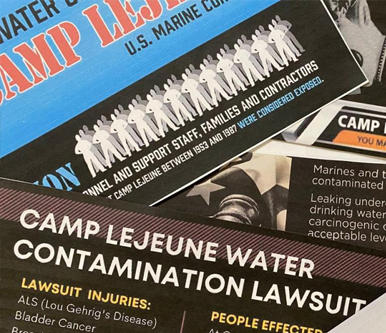Seeking Justice: The Camp Lejeune Toxic Water Lawsuit
For decades, Camp Lejeune, a United States Marine Corps base in North Carolina, was not only a home to service members and their families but also a site of hidden danger lurking beneath its grounds – toxic water contamination. The revelation of this environmental tragedy has sparked a legal battle for accountability and justice, shedding light on the devastating consequences of water pollution on military personnel and their loved ones.
Between the 1950s and 1980s, residents of Camp Lejeune were unknowingly exposed to a toxic cocktail of chemicals in their drinking water, including volatile organic compounds (VOCs) such as trichloroethylene (TCE) and perchloroethylene (PCE), as well as benzene and other hazardous substances. These contaminants seeped into the base's water supply from various sources, including leaking fuel tanks, industrial activities, and improper waste disposal practices.
For years, veterans and their families who lived at Camp Lejeune have reported a wide range of health problems linked to the contaminated water, including cancers, birth defects, neurological disorders, and other serious illnesses. Despite mounting evidence and outcry from affected individuals, the full extent of the harm caused by the toxic water exposure was not officially acknowledged until the late 1990s.
In response to growing concerns, Congress passed the Camp Lejeune Toxic Exposure Act in 2012, providing healthcare benefits to veterans and family members who had been exposed to contaminated water at the base. Additionally, a series of lawsuits have been filed against the United States government and private contractors responsible for the pollution, seeking compensation for the physical, emotional, and financial toll inflicted upon those affected.
The legal battle surrounding the Camp Lejeune toxic water lawsuit is complex and ongoing, with plaintiffs facing significant challenges in proving causation and liability. However, recent developments, including court rulings and settlements, have provided a glimmer of hope for justice and accountability.
In 2020, the United States Supreme Court ruled in favor of veterans seeking to sue the government for damages related to the toxic water exposure, overturning previous lower court decisions that had blocked such lawsuits on grounds of sovereign immunity. This landmark decision marked a crucial step forward in the fight for justice for Camp Lejeune survivors and their families.
While progress has been made, the journey towards resolution and restitution is far from over. Advocates continue to push for comprehensive support services, healthcare coverage, and compensation for all those impacted by the Camp Lejeune water contamination. Moreover, efforts to prevent similar environmental disasters and ensure the safety of military installations across the country remain imperative.
As the Camp Lejeune toxic water lawsuit unfolds, it serves as a sobering reminder of the profound human cost of environmental negligence and the urgent need for accountability, transparency, and proactive measures to protect the health and well-being of military personnel, their families, and communities nationwide.


